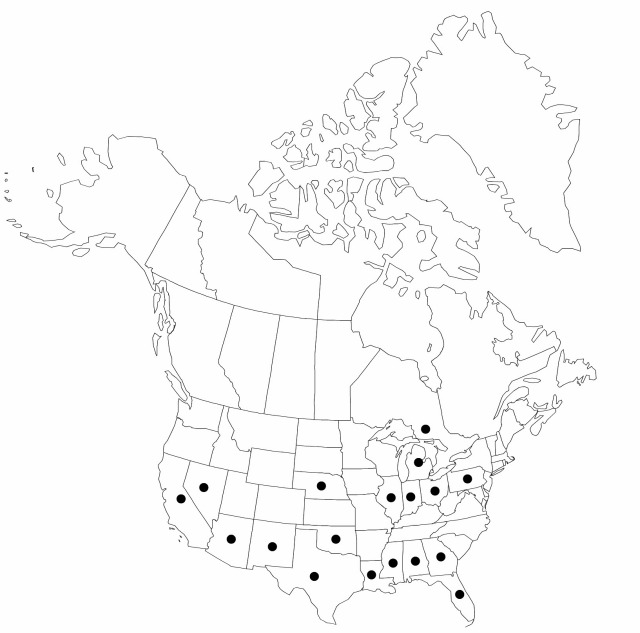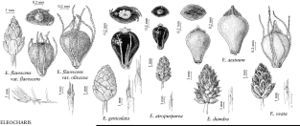Difference between revisions of "Eleocharis geniculata"
in J. J. Roemer et al., Syst. Veg. 2: 150. 1817.
FNA>Volume Importer |
imported>Volume Importer |
||
| (One intermediate revision by the same user not shown) | |||
| Line 1: | Line 1: | ||
{{Treatment/ID | {{Treatment/ID | ||
|accepted_name=Eleocharis geniculata | |accepted_name=Eleocharis geniculata | ||
| − | |accepted_authority=(Linnaeus) Roemer & Schultes | + | |accepted_authority=(Linnaeus) Roemer & Schultes |
|publications={{Treatment/Publication | |publications={{Treatment/Publication | ||
|title=in J. J. Roemer et al., Syst. Veg. | |title=in J. J. Roemer et al., Syst. Veg. | ||
| Line 8: | Line 8: | ||
}} | }} | ||
|common_names=Bent spikerush | |common_names=Bent spikerush | ||
| + | |special_status={{Treatment/ID/Special_status | ||
| + | |code=F | ||
| + | |label=Illustrated | ||
| + | }} | ||
|basionyms={{Treatment/ID/Basionym | |basionyms={{Treatment/ID/Basionym | ||
|name=Scirpus geniculatus | |name=Scirpus geniculatus | ||
| Line 51: | Line 55: | ||
-->{{#Taxon: | -->{{#Taxon: | ||
name=Eleocharis geniculata | name=Eleocharis geniculata | ||
| − | |authority=(Linnaeus) Roemer & Schultes | + | |authority=(Linnaeus) Roemer & Schultes |
|rank=species | |rank=species | ||
|parent rank=series | |parent rank=series | ||
| Line 64: | Line 68: | ||
|publication title=in J. J. Roemer et al., Syst. Veg. | |publication title=in J. J. Roemer et al., Syst. Veg. | ||
|publication year=1817 | |publication year=1817 | ||
| − | |special status= | + | |special status=Illustrated |
| − | |source xml=https:// | + | |source xml=https://bitbucket.org/aafc-mbb/fna-data-curation/src/2e0870ddd59836b60bcf96646a41e87ea5a5943a/coarse_grained_fna_xml/V23/V23_151.xml |
|genus=Eleocharis | |genus=Eleocharis | ||
|subgenus=Eleocharis subg. Eleocharis | |subgenus=Eleocharis subg. Eleocharis | ||
Latest revision as of 20:38, 5 November 2020
Plants tufted, without creeping rhizomes. Culms to 45 cm × 0.2–1 mm. Leaves: distal leaf sheaths persistent, firm, distally tightly sheathing, apex acute. Spikelets orbicular to ovoid, 1–9 × 1–4 mm, apex rounded to acute; proximal scale without flower, not amplexicaulous; floral scales to 125, 11–14 per mm of rachilla, tightly appressed, dark red-brown to stramineous, ovate to elliptic, 0.8–3 × 0.6–2(–2.3) mm, membranous to cartilaginous, apex rounded to acute. Flowers: perianth bristles (0–)4–8, typically 7, red-brown, rarely whitish, vestigial to much exceeding tubercle, typically equaling achene, spinules few to dense; styles 2-fid. Achenes brown ripening to black, biconvex, orbicular to obpyriform, 0.5–1.1 × 0.3–0.7 mm, apex rarely constricted proximal to tubercle, very finely reticulate at 40X. Tubercles stramineous to whitish, umbonate to subconic, 0.2–0.4 × 0.2–0.5 mm, apex rounded to acute. 2n = 10.
Phenology: Fruiting spring–winter (Mar–Dec).
Habitat: Brackish creeks, canal banks, dune depressions, hammocks, irrigation ditches, lakeshores, lagoons, mangrove thickets, maritime mud flats, ditches, salt marshes
Elevation: 0–1500 m
Distribution

Ont., Ala., Ariz., Calif., Fla., Ga., Ill., Ind., La., Mich., Miss., Nebr., Nev., N.Mex., Ohio, Okla., Pa., Tex., Mexico, West Indies, Bermuda, Central America, South America, Asia, Africa, Pacific Islands.
Discussion
The name Eleocharis caribaea (Rottbøll) S. F. Blake is considered by most contemporary authorities to be misapplied (K. L. Wilson 1990). Eleocharis geniculata has been reported from South Carolina; I have not seen a voucher.
Selected References
None.
